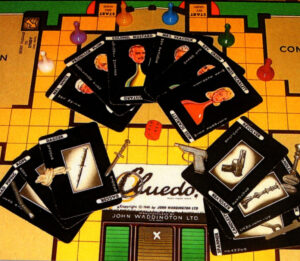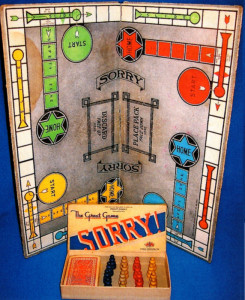
Christmas is the time to get out the well-used board games. Chris Smith takes a look at two classics and a forgotten gem.
Monopoly
Monopoly is perhaps the classic Boxing Day board game – and the cause of many a family argument… It was the game’s 75th anniversary in 2010. We think of it as very British due the street names but it actually came from the USA.
The game was patented by Quaker Lizzie Magie as The Landlord’s Came in 1904. It was intended to show that capitalism could make some super-rich, yet others would become bankrupt (perhaps a familiar lesson in the first decade of this century). That game wasn’t a big seller, and it took until 1910 to be published commercially. Meanwhile, copies were home-made by Quakers and students, and the game spread by word of mouth.
As people tired of the socialist elements Magie sold the patent to Parker Brothers in 1935 for just $500. The same year,
Charles Darrow took a similar idea to them, with the board more or less as we now know it, showing the streets of Atlantic City, Philadelphia. Eventually Darrow became the world’s first millionaire game designer.
By 1936 Waddington’s had bought the British rights and changed it to feature the streets and stations of London. These days many regional versions are produced and the game is sold in 40 languages in 108 countries.
As is now well-known, in World War II silk maps were slid into holes cut in the boards and sent to POWs, the money was replaced with local currency, and compasses were hidden in the pieces.
Cluedo

Cluedo is one of those games you should only play when you have a lot of time. It’s a game full of murder, intrigue, surprise and mystery, one being why its creator never benefited from the success the game has today.
The game is simple – work out ‘whodunnit’. Characters including Colonel Mustard, Reverend Green and Professor Plum move around Tudor Mansion, trying to work out who murdered the victim, and what weapon they used.
It was invented in a non-commercial form by Anthony Pratt in wartime Britain. He saw it as a morale booster – a means of socialising and making the best of a bad time. Originally he called it Murder! and he demonstrated it to Waddington’s in 1945, but due to materials shortages, it wasn’t published until 1949. It wasn’t initially a big seller, and Pratt signed over all overseas royalties to Waddington’s.
He received patent payments for a few years, but it was only after these expired, the game became the success it is today. Pratt died in an old peoples’ home in the 1990s, with little to thank the game for.
Sorry!
Sorry! is a classic family game that is great fun, but since the 90s is unfortunately no longer sold in the UK. The game is still available in America, with spin-off versions ranging from The Simpsons to Spider-Man 3.
It was invented in the 1920s by William Storey, from Southend-on-Sea, and sold by Waddington’s from the mid-1930s.
The game is beautifully simple, fast-paced, and fun. Up to four people can play, and the aim is to circle the board, and get your counters into one of four home positions in your colour.
Instead of rolling a die, you pick up a card – for example ‘3 Forward’, and move your pieces as instructed. The twist is the card that says Sorry! – it allows you to place one of your unplayed pieces on the board, in place of an opponent’s, and send their piece home. Played properly the game is extremely competitive, and runs at a tremendous pace.
It’s one of those forgotten gems that deserves to be dusted off every once in a while, and Christmas is a great time to do it.
Want to rediscover or collect old board games?
Donay Games’ online shop stocks vintage games from 1790 right up to the 1970s.
See www.donaygames.com








